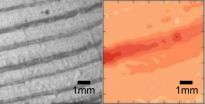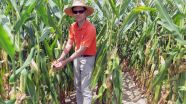INFORMATION:
Media contacts:
Si-Chong Chen: Sichong.chen@unsw.edu.au
Professor Angela Moles: + 612 9385 8302, a.moles@unsw.edu.au
UNSW Science media: Deborah Smith, +612 9385 7307, + 61 478 492 060, deborah.smith@unsw.edu.au
Global study of seed consumption uncovers wider risk to plant species
2015-07-20
(Press-News.org) The first worldwide study of animals and the seeds they eat has overturned a long-held assumption - that large animals mainly eat large seeds.
The finding by UNSW Australia scientists has implications for conservation showing that a wider variety of plants than is often thought could be at risk if large animals go extinct and do not disperse their seeds.
In a comprehensive study, UNSW's Si-Chong Chen and Professor Angela Moles compiled and analysed data on more than 13,000 animal-seed interactions, based on previously published reports.
"It is the first broad-scale study of the relationship between animal body mass and ingested seed size ever undertaken," says Ms Chen, a PhD candidate in the UNSW School of Biological, Earth and Environmental Sciences.
"We covered all vertebrate groups - fish, amphibians, reptiles, birds and mammals. And we included animals from many different areas - from the Arctic tundra to the tropical rainforests."
The research is published in the journal Global Ecology and Biogeography.
The smallest seeds in the study were the tiny seeds of the mountain snowberry, and they were eaten by the smallest animals in the study - skinks on the Chatham Islands near New Zealand.
The largest seeds were the 9-centimetre long seeds of the African tropical forest tree, Balanites wilsonia. They were eaten by the largest animals in the study - 4-tonne African elephants.
"It has long been predicted that as the body size of animals increases so does the size of the seeds they ingest," says Ms Chen.
"Big animals do eat some big seeds from fleshy fruits. But the prediction is wrong because it overlooks the fact that big animals like buffalos, cows, deer and zebras also accidentally vacuum up hundreds of small seeds as they graze on short grassy vegetation."
The finding changes the predicted impact of the loss of larger animals due to hunting, habitat loss or climate change.
"If large animals become extinct in an ecosystem, it will not only be the largest-seed species that lose their potential dispersers; some of the smallest-seed species will also be at risk," says Ms Chen.
In Australia, Southern Cassowary birds eat more than 100 different seed species, with the largest on their menu being the 6-centimetre wide seeds from Beilschmiedia rainforest trees.
"Other Australian birds such as emus, black swans, malleefowl and pelicans also feed on a variety of seeds," says Ms Chen.
The South American tree frog, Xenohyla truncate, is the only fruit-eating amphibian known in the world, and it feeds on five types of seeds.
"Even some fish consume seeds - mostly big fish found in the Amazon River that eat seeds that drop into the water from riverside plants," says Ms Chen.
"Other animals like the aardvark, armadillo, sloth and endangered New Zealand kakapo also eat a wide variety of seeds."
ELSE PRESS RELEASES FROM THIS DATE:
Sticky tape & phosphorus the key to ultrathin solar cells: ANU media release
2015-07-20
Scientists studying thin layers of phosphorus have found surprising properties that could open the door to ultrathin and ultralight solar cells and LEDs.
The team used sticky tape to create single-atom thick layers, termed phosphorene, in the same simple way as the Nobel-prize winning discovery of graphene.
Unlike graphene, phosphorene is a semiconductor, like silicon, which is the basis of current electronics technology.
"Because phosphorene is so thin and light, it creates possibilities for making lots of interesting devices, such as LEDs or solar cells," said lead ...
Researchers demonstrated the first realization of invisible absorbers and sensors
2015-07-20
The manipulation of light has led to many applications that have revolutionized society through communications, medicine and entertainment. Devices consuming the energy of electromagnetic radiation, such as absorbers and sensors, play an essential role in the using and controlling of light.
The researchers at the Aalto University Department of Radio Science and Engineering have demonstrated the first realization of absorbers that do not reflect light over a wide range of frequencies. All previous absorbers at other frequencies were either fully reflective, as mirrors, ...
As the oceans warm, wide-ranging species will have an edge
2015-07-20
Marine species that already have large ranges are extending their territories fastest in response to climate change, according to new research from University of British Columbia biodiversity experts.
The study is one of the first comprehensive looks at how traits--other than thermal niche--impact marine animals' ability to respond to climate change. It could help improve global predictions of how different species redistribute as the oceans warm, and identify species in greatest jeopardy.
"We have a bit of a mystery as to why some animals are moving quickly into cooler ...
Scientists reveal 'woodquakes'
2015-07-20
Wood and its response to stress or strain has been less known at a fundamental level - until now.
The structural properties of brittle materials like rock or ceramic, such as cracking under stress, have long been studied in detail, providing insight into avalanches, earthquakes and landslides. Wood and its response to stress or strain has been less known at a fundamental level - until now.
Scientists, from the Department of Applied Physics at Aalto University in Finland, have applied well-established methods for studying all kinds of materials to wood, namely through ...
Keep fears at bay by learning something new
2015-07-20
Philadelphia, PA, July 20, 2015 - Exposure therapy is a commonly used and effective treatment for anxiety disorders, including posttraumatic stress disorder, obsessive-compulsive disorder, and phobias.
The goal of such therapy is to extinguish fear, which is accomplished by presenting cues that are known to predict a negative experience in the absence of that experience. Over time, learning that the 'danger cue' is no longer dangerous produces extinction of the fearful response.
However, fears and the associated defensive behaviors resulting from that fear often return ...
Clemson scientists stopping small insects from doing big damage to corn
2015-07-20
FLORENCE - There are almost 275,000 acres of corn planted in South Carolina, with an economic impact of approximately $130 million. Though this is dwarfed by Midwest states such as Iowa (13.7 million acres, $8.75 billion), it's still a lot of corn - enough, at least, to make a person think S.C. would be a utopia for the insects that like to feast on tasty yellow kernels.
But instead of being a slice of paradise, a cornfield can often be a far-from-optimal host for pests such as the corn earworm. Francis Reay-Jones, an associate professor and research scientist for Clemson ...
Study finds autism, ADHD run high in children of chemically intolerant mothers
2015-07-20
A new study from The University of Texas Health Science Center at San Antonio found that mothers with chemical intolerances are two to three times more likely than other women to have a child with autism spectrum disorder (ASD) or attention deficit hyperactivity disorder (ADHD).
The medical study was published in the July-August 2015 issue of the Journal of the American Board of Family Medicine.
People who are chemically intolerant often have serious reactions to common chemicals and some become too sick to carry out routine functions. Chemical intolerance affects about ...
Self-proclaimed experts more vulnerable to the illusion of knowledge
2015-07-20
New research reveals that the more people think they know about a topic in general, the more likely they are to allege knowledge of completely made-up information and false facts, a phenomenon known as "overclaiming." The findings are published in Psychological Science, a journal of the Association for Psychological Science.
"Our work suggests that the seemingly straightforward task of judging one's knowledge may not be so simple, particularly for individuals who believe they have a relatively high level of knowledge to begin with," says psychological scientist Stav Atir ...
NYU Langone researchers to present new findings at 2015 Alzheimer's Association Conference
2015-07-19
(New York, July 18, 2015) Researchers from the NYU Langone Medical Center, NYU School of Medicine will present new findings at the 2015 Alzheimer's Association International Conference in Washington, D.C., July 18-23-2015.
The NYU Langone Alzheimer's Disease Center is comprised of the Center for Cognitive Neurology, Center for Brain Health and the Parkinson's and Movement Disorders Center.
It is one of thirty Alzheimer's disease research centers in the United States supported by the National Institute on Aging (NIA). As an NIA-supported research facility, the center's ...
Researchers discover a possible reason for drug resistance in breast tumors
2015-07-17
HER2 membrane proteins play a special role in certain types of breast cancer: amplified levels of HER2 drive unrestricted cell growth. HER2-tailored antibody-based therapeutics aim to prevent cancer cell growth. However, two-thirds of HER2 positive breast cancer patients develop resistance against HER2-targeting drugs. The reason for this is not yet understood. Researchers now found out, that HER2 dimers appeared to be absent from a small sub-population of resting SKBR3 breast cancer cells. This small subpopulation may have self-renewing properties that are resistant to ...




